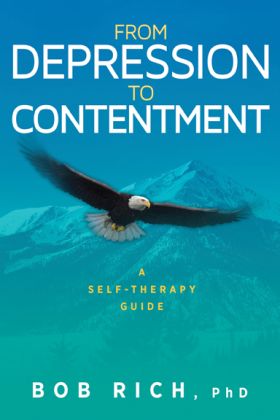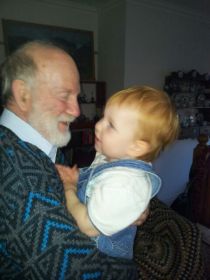Bob has retired 5 times so far from 5 different occupations, but is going strong as a Professional Grandfather. Job specification is to strive for a future for the youngsters of today, and a future worth surviving in. They are “Generation Z,” and if business as usual continues, that label is prophetic. Going back to the invention of agriculture and animal husbandry some 10,000 years ago, every generation has stolen from its future. This is it: there is no more future to steal from. We need to change or we’ll join the dodo. According to best predictions, we still have a chance of saving a future, but it is a SMALL window.
All our current problems are symptoms of a global culture that rewards and encourages the worst in human nature: greed, fear-and-hate of others (which is the one monster), short term thinking. Our one hope is a miraculous transformation into a global culture of empathy, decency, cooperation, examining the long-term implications of our actions.
The second part, building a future worth surviving in, is to aim for a global culture that rewards and encourages the best in human nature: empathy, decency, cooperation, examining the long-term implications of our actions.
Even if it didn’t save the world, wouldn’t it be better to live in such a society?
How to achieve it? Every sentient being is an apprentice Buddha, an apprentice Jesus. You are not here to gain wealth, power, status, admiration, even happiness, but to progress toward enlightenment. We are caterpillars feeding on the green leaves of experience, until we can graduate as butterflies and can get off the wheel of life.
If most people realized this, we’d be there. Because, how does an apprentice learn? In two ways: By learning from a master, and by making mistakes and learning from them. Many enlightened spirits have shown us how. You can certainly think of several examples, but it is enough quote one. The Dalai Lama has said, “My religion is kindness. The purpose of enlightenment is to be of service.”
Part of Bob’s expertise is in positive psychology: research-based tools for rising way above “normal,” which is the walking wounded. Interestingly, these tools are identical to the recommendations of Buddhism, Christianity, Islam, Confucianism, and every other great religion, but an atheist can use them, and gain enlightenment.
All of Bob’s 19 published books carry this message, but without preaching, because he runs the other way when someone preaches at him. The aim of all writing, even instructional books, is to entertain. One reviewer of “From Depression to Contentment: A self-therapy guide” has written, “All of Bob’s novels I’ve read are full of therapeutic lessons. Here is a book designed as a set of therapeutic lessons that is as enjoyable to read as any novel.”
His writing includes science fiction, historical fiction, and whatever else his characters tell him to write, a biography that has won several awards, and self-help books in varied fields including psychology, woodcraft, owner-building, and dealing with cancer. Five books, and over 40 short stories have won awards.
Bob is an experienced interviewee, and his responses to questions follow his dictum: “Life is too short for the seriousness it deserves.” He is a grumpy old man with no sense of humor, but he easily shows that his audience has a sense of humor: they tend to laugh at what he says or writes.
Dr Bob Rich is an Australian storyteller who started writing in 1980 because a bunch of teenagers kidnapped him. He was making adobe bricks for the house he was building with his own hot little hands when they descended on him, because they needed one more male for a boys vs. girls soccer game. Who was he to disobey? Naturally, he soon slipped on the mud he’d carried with him, and ended up in hospital with torn cartilage in his knee. His advice: don’t tear the cartilage in your knee!
Bored out of his mind, he borrowed the office typewriter (remember those?) and wrote his first article on building, something he was an expert on, given his Ph.D. in psychology. His words took flight, and his first book, on how to build your house, sold hundreds of thousands of copies. It went through 4 editions between 1986 and 2018.
Later, he trained as a nurse, which toughened him enough to be able to transition into psychotherapy despite his all-too-overdeveloped empathy. The first lesson of nursing is, “It’s not your pain. You are not there to share it, but to relieve it.” Therapy is even better: you’re there to empower your client to relieve it.
However, while in nursing school, he was surrounded by gorgeous 18-year-olds, and had the choice of making a fool of himself or doing something creative. So, he wrote short stories. The first one he submitted to a contest won a prize, and he was hooked.
All his life, Bob has been a secular Buddhist. He discovered this when wanting to get married. The girl asked to marry in her church, and the minister interviewed Bob to see if he would admit a nonbeliever into the hallowed precincts. After an afternoon of chatting, he said, “You’re a Buddhist, did you know that? Now, let’s set the date.”
Given the handicap of a scientific training, Bob doesn’t believe anything but goes with the evidence. To check on this claim, he needed to spend a day at the University library, not having a time machine to access the internet. He found his belief system there, and since then has considered Siddhartha Gautama his favorite teacher, though there are many others, including a Jewish carpenter.
Bob’s major passion is being a Professional Grandfather. He has hundreds of grandkids all around Earth (none in Antarctica presently). They track him down with emails of despair, and having the gift of healing words, he almost invariably leads them to a good life. Some cease contact once they are OK. Others stay in touch for years from friendship, from having joined his team and needing advice on how to help others, and often for needing their hand held after a backslide. There is no greater joy than being of service, so despite his busy schedule, mentoring and supporting them is top priority.









